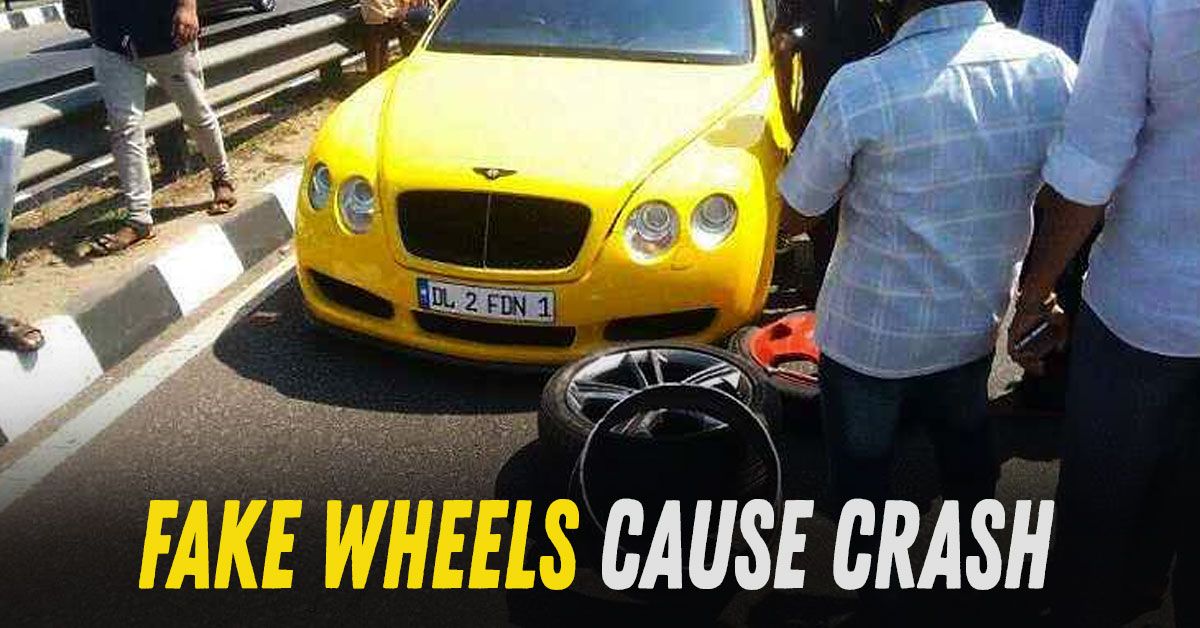Multi-Crore Bentley Continental GT Suffers Wheel Failure Due To Fake Alloy Rims


Upgrading to alloy wheels is one of the most common ways car owners try to boost the visual appeal of their vehicles. For many, it’s a simple way to stand out. But as one Bentley owner recently found out, choosing the wrong type of wheels, especially the cheap, low-quality ones, can lead to disaster—even for a luxury car.
The car involved in this incident was a bright yellow Bentley Continental GT. It had a lot of customisation gone into it, including the paintjob. While cruising along a highway in India, one of the wheels suddenly came apart. The car scraped the road for several meters before it finally came to a complete halt.
Fortunately, no one was hurt. There were no reports of a crash, but the failure was serious. A closer look revealed that the Bentley had been fitted with Audi S8-style replica rims. These were not factory wheels but cheap replicas designed to copy the look of Audi’s famed wheels. These, however, did not offer the same quality or safety levels.
This kind of failure is not just a rare accident—it’s a warning. Fake alloy wheels can be dangerous, no matter how attractive or stylish they might look. Many car owners are unaware of the risks they take when they pick aftermarket rims based only on looks or price.
The biggest issue with replica wheels is that they are not tested for strength and safety. Unlike genuine OEM (Original Equipment Manufacturer) parts, they don’t go through proper stress checks or quality inspections. These are thus, much more likely to bend, crack, or completely break when put under pressure—like when hitting a pothole at high speeds.
Some fake rims even fail to create a perfect seal with the tyre, leading to slow air leaks. Over time, this can cause a flat tyre or even a sudden blowout. In a fast-moving car, that’s a serious risk.
Another concern is load capacity. Cheap alloys might not be able to support the full weight of the vehicle, especially during long drives or on rough roads. A failure like the one seen in this Bentley could happen to any car using the wrong set of wheels.
It’s not just the safety risks that make fake rims a bad idea for buyers. Fitting non-approved wheels can void a car’s warranty. If they cause damage to the suspension, brakes, or tyres, the manufacturer could refuse to cover the cost of repairs. Insurance companies may also deny claims if the cause of an accident is linked to poor-quality aftermarket parts.
To begin with, avoid choosing rims which feel ' too cheap to be real'. Extremely low prices are often a sign of poor build quality and shortcuts in manufacturing.
Whenever possible, stick to Original Equipment Manufacturer (OEM) rims. These are made to match your vehicle’s exact specifications, put through strict stress checks and tested under real driving conditions.
If you want a custom look, go with a trusted aftermarket brands. Reputable companies invest in safety testing and use high-grade materials in manufacturing to ensure durability.
Finally, make sure the new wheels fit your vehicle correctly. That includes the size, offset, and Pitch Circle Diameter (PCD). A poor fit can lead to uneven tyre wear, poor handling, and long-term damage to the vehicle.
In the case of this Bentley Continental GT, the owner may have wanted to make a statement with stylish wheels but ended up giving a message to others- 'Car parts, especially those that affect safety—should never be chosen based on looks alone.'